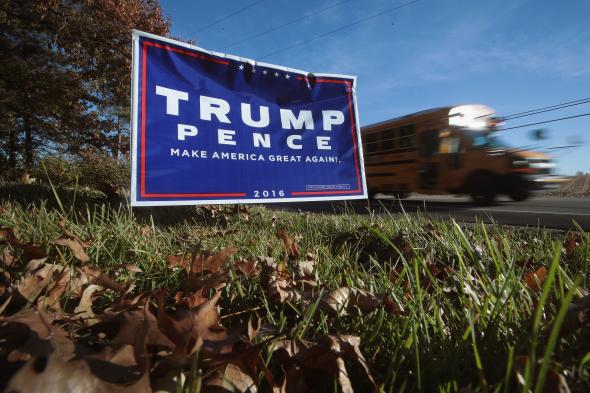If you’re one of the 1,500 people who’ve joined Slate Plus since the election, welcome, and thank you. If you found Slate useful during the campaign, I’m glad. Now there’s more work to do, and your support helps us get it done.
From Slate
Here’s how we began to reckon with the new world this week.
On Trump voters: Rural voters took a stand and elected a president who won’t help them at all, writes Henry Grabar. Some of them are “good people”? Nah, argues Jamelle Bouie. They had “good intentions”? Screw that, says Aleksandar Hemon.
On the GOP: House Republicans, led by Paul Ryan, are running the show now, argues Jim Newell. Does that mean they’ll check some of Trump’s worst excesses? Hard to imagine, Mark Joseph Stern points out, since they rolled over for Trump’s white nationalist “chief strategist” Steve Bannon.
On the Democrats: Jamelle Bouie thinks they’re blowing it. Michelle Goldberg thinks Keith Ellison, who hopes to lead the Democratic National Committee, represents a better way forward. Daniel Gross wonders if the last best hope for progressive values could be … Fortune 500 corporations.
Can’t bear to think about it? Neither can Daniel Engber. Read these four poems, written between 1884 and 1968 and selected by Robert Pinsky, who writes, “Often, the best works of art about an historic event come from long before.”
Not From Slate
Alexandra Petri has her fangs out for Republicans going soft on Steve Bannon: “Listen, when we need to denounce an actual racist, anti-Semite, white supremacist, Islamophobe, you name it, I will be there. I promise. I will not hesitate to do that, when the time comes, clearly and appropriately labeled. I have yet to see one, but when I do, boy, I will light into him! It will be something to see.”
Matt Yglesias points out that the Facebook problem goes way beyond made-up stories: “A news diet overwhelmingly driven by shareability and algorithmic targeting is going to be profoundly misleading whether or not it contains fake news.”
Jessica Hopper implores fans hoping music will get better under Trump to stop kidding themselves: “The equation that great art is best born in a hothouse of desperation is a false one. It’s a blithe dare for artists to come out on the other side of trauma dancing — survive, and entertain us, too.”
Teju Cole on the terrifying day after the election: “So many were falling into line without being pushed. It was happening at tremendous speed, like a contagion.”
Slate Plus
Two of our Slate Academies have new episodes: Helaine Olen’s United States of Debt tackles the ongoing foreclosure crisis, and Jack Hamilton’s Pop, Race, and the ’60s jumps to 1971, to investigate a couple of dark, complicated records by the Rolling Stones and Sly and the Family Stone. Listen on the site, or subscribe via our podcast page or our iOS app.
Thanks again for your membership. See you next week.
Gabriel Roth
Editorial director, Slate Plus
